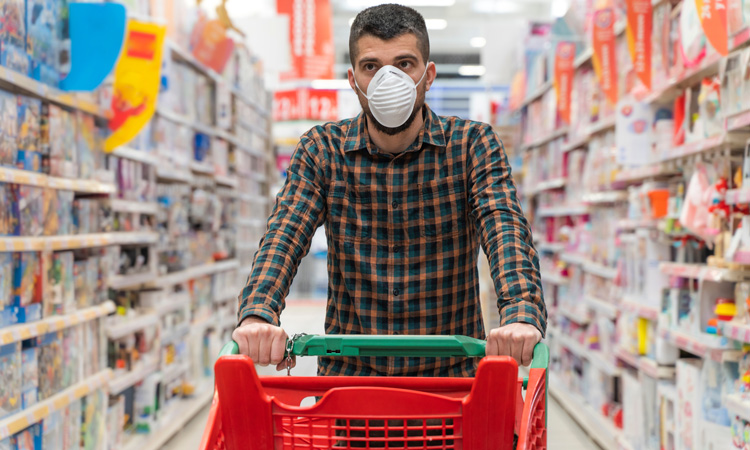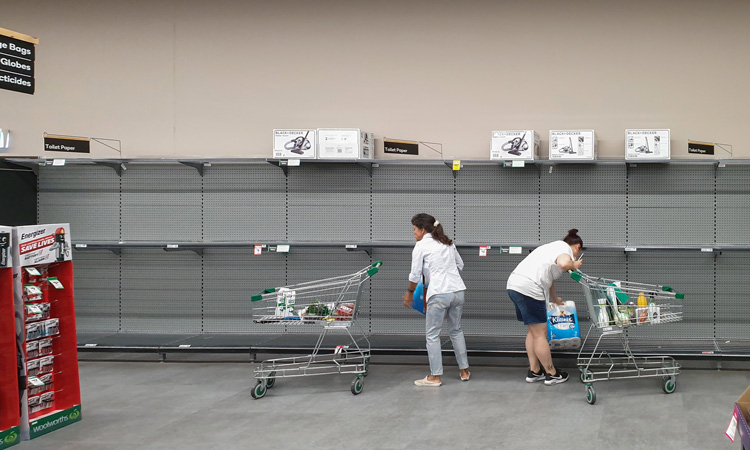COVID-19: should the food industry be concerned?
- Like
- Digg
- Del
- Tumblr
- VKontakte
- Buffer
- Love This
- Odnoklassniki
- Meneame
- Blogger
- Amazon
- Yahoo Mail
- Gmail
- AOL
- Newsvine
- HackerNews
- Evernote
- MySpace
- Mail.ru
- Viadeo
- Line
- Comments
- Yummly
- SMS
- Viber
- Telegram
- Subscribe
- Skype
- Facebook Messenger
- Kakao
- LiveJournal
- Yammer
- Edgar
- Fintel
- Mix
- Instapaper
- Copy Link
Posted: 17 March 2020 | Sam Mehmet (New Food) | No comments yet
With advice from government bodies, industry consortia and workplace authorities looking to prevent further impact caused by the novel coronavirus pandemic, New Food’s Sam Mehmet reflects on the outbreak and its repercussions for the food and beverage sector.


While we hear reassurance from food safety bodies such as the European Food Safety Authority (EFSA) that “there is currently no evidence that food is a likely source or route of transmission of COVID-19,” we are all still, surely, feeling a little uncertain. Is our food truly safe? What impact will this unprecedented pandemic have on the food and beverage industry further down the line?
EFSA’s Chief Scientist, Marta Hugas, said that “experiences from previous outbreaks of related coronaviruses, such as severe acute respiratory syndrome coronavirus (SARS-CoV) and Middle East respiratory syndrome coronavirus (MERS-CoV), show that transmission through food consumption did not occur” and that we – industry and consumer alike – can be confident that this translates to COVID-19.
Of course, it seems obvious that food and beverage facilities must follow precautionary hygiene and sanitation recommendations to prevent contamination and reduce risk – as they would have been doing already (hopefully) – but is cleanliness really the primary concern for the food industry?
Reports from across the world have seen bare supermarket shelves and empty fridges as people panic-buy their way into self-isolation and national lockdowns. Food banks are being forced to close as donations slowly dissipate, and supply chains across the world are being restricted.
There is currently no evidence that food is a likely source or route of transmission of COVID-19
Tim Lang, Professor of Food Policy at the Centre for Food Policy, City University of London, recently told Channel 4 News that there has been a “revolution” in the British food system over the last 40 years and modern supermarkets simply do not keep enough food in storage to support events such as the one we have all been suddenly plunged into. Daily and efficient deliveries allow for fresh produce to be stocked onto the shelves as part of a seamless and structured timetable, and supermarkets work with a “just in time” approach; a system which Prof Lang regards as “very easy to disrupt”.
The UK government announced that it will work with local authorities to extend the hours that deliveries can be made to supermarkets and other food retailers to help the industry respond to these novel obstacles, meaning that food retailers can increase the frequency of deliveries to their stores and move stocks more quickly from warehouses across the country to replenish their shelves.
Helen Dickinson, OBE, Chief Executive of the British Retail Consortium, believes supermarkets are doing their best amid the panic. “Retailers are working incredibly hard to keep shops well stocked and deliveries running as smoothly as possible. In the face of unprecedented demand as a result of COVID-19, food retailers have come together to ask their customers to support each other to make sure everyone can get access to the products they need.”
“Buying patterns have shifted dramatically as people stock up on supplies,” commented Carl Perrson, Senior Director of Global Cross-Category Consumer Insights at PepsiCo. In addition to hand sanitisers and toilet paper, shoppers are passing over fresh items to fill their carts with canned and frozen foods. “It really is a reversal of everything we learned about shopper trends over the past decade or so,” he said. Furthermore, food manufacturers are likely to see fluctuations in their demand, posing potential economic threat.


But is simply asking consumers to limit their shopping enough? Should supermarkets ban mass purchases? Some are already doing so. Moreover, travel restrictions and border closures mean that imported produce might not have the appropriate means to find its way to its usual destination; assuming that the delivery driver has not already been quarantined or told to stay at home! The same goes for food production and processing facilities – social contact and proximity advice from governments also applies here.
Countries are however beginning to introduce measures in an attempt to resolve these issues, such as by opening priority lanes and borders solely for emergency services, cargo flow and other essential necessities, but restrictions are still likely to be put in place.
Buying patterns have shifted dramatically as people stock up on supplies
Commenting on the situation in China, where COVID-19 was originally identified in December 2019 and where new domestic case numbers are now only being reported in single digits, Walter Kemmsies, Managing Director and Economist for JLL’s US Ports, Airports and Global Infrastructure group, said: “In the last week, pretty much all the factories are operational again. The problem is they are only at 50 to 75 percent capacity… The problem is [getting] truck drivers.”
In an attempt to bridge these supply chain gaps, food business, as seen in advice issued by the Food Safety Authority of Ireland (FSAI), are beginning to leave out or substitute ingredients in a product, change their process of production and alter their packaging – all creative solutions to put products back on supermarket shelves, but does this come at extra cost? Regardless, the FSAI stressed it is essential for these businesses to remember their legal obligations to only place safe food on the market.
Any changes to product, packaging or processing requires a full review of the business’ food safety management system (GHP and HACCP), the FSAI stated, which would allow them to risk assess any food safety issues that could result from the proposed changes, such as the introduction of allergens or the altering of a products’ shelf life.
Food businesses are not alone and as with many problems that the food and beverage industry is confronted with – and there have been a few – it seems to fall back to the progression of collaboration. Transparency, integrity and trust are all essential if we are to ensure safe and abundant food is being delivered to the people who need it across the world. COVID-19 may have limited our travel, and we might be subject to increased economic pressure, but people need to eat! As long as we are prepared and taking the right measures, it seems that there is no real need to be concerned… at least for now.
Related topics
COVID-19, Food Safety, Outbreaks & product recalls, Supply chain, The consumer
Related organisations
British Retail Consortium, European Food Safety Authority (EFSA), Food Safety Authority of Ireland (FSAI), PepsiCo
Related people
Carl Perrson, Helen Dickinson, Marta Hugas, Tim Lang, Walter Kemmsies








